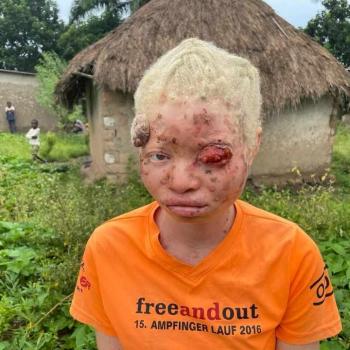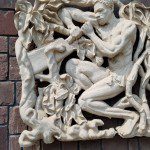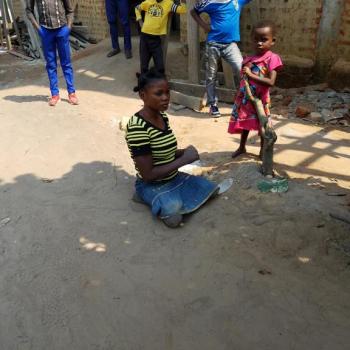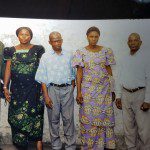
Used with permission
Djemba and Marie weren’t speaking. They hadn’t spoken for a week, not since Djemba had yelled at her for taking too long to serve dinner. They had been married for four years, and had had a few of these spats, which usually faded away. Djemba would say something to Marie—it didn’t matter what—indicating that the time of coldness was over, and they would continue their lives until the next argument.
They were at the church, Djemba setting out the chairs for the leadership on the front row. He taped notices on all doors in French and English: “Masks are not required but are appreciated.” He was assigned to take temperatures. He took five before the stranger (unmasked) entered and presented his forehead for the scan. Temperature: normal. The stranger was clearly Muslim, wearing a white gown and a shiny, dark beard. He had salt and pepper hair, curled and knotted like lambs’ wool. It had clearly not known a comb for awhile. Djemba, on the other hand, had gotten a razor haircut the day before. He needed to set an example.
“We’re preparing for General Conference,” said Djemba to the stranger, and then, “This is a Christian meeting. Why are you here?”
The stranger raised his eyes to Djemba’s, who immediately had a vision. This was not surprising; Djemba had visions quite often. But he had never had a vision of his wife until this moment. He looked across the room at her (she was cleaning the large television screen, where various church authorities would be zoomed in to address the congregation), and saw her. Light from windows on each side of the church angled down to her gold headwrap and made a halo, which illuminated her face and showed her burnished cheekbones. She seemed to sense his gaze and looked back at him. Djemba’s own voice answered, though the words were strange: “I adore you, thou being of light.”
“You should sit up front,” said Djemba to the stranger, and promptly fainted. Two women knelt to help him, slapping his cheeks to wake him up. It was immediately effective. Dazed, he watched as the stranger moved up the aisle.
Other leaders, all in their suits and ties (and all with fresh haircuts), approached the first row. Nobody sat on the stand except those running the volume controls and the Zoom meeting itself—admitting people who were in the virtual waiting room. The only thing on the stand was the camera aimed at the pulpit from a tripod.
The stranger sat next to a little boy on the second row, whose father (Gui) was testing the microphone. The boy, dressed in jeans and a purple Utah Jazz t-shirt, played with the stranger’s hair and stroked his beard.
“Salt Lake City, can you hear me?” said Gui into the microphone.
The printed name of Elder Ebenezer Snow appeared on the television screen and was quickly replaced by the image of a dark-haired, white man in glasses.
“You’re on mute,” said Gui.
The white man moved his mouth.
“Can you unmute yourself?” said Gui.
The white man stared.
“Unmute.” Gui gestured to his ears.
“Oh, I was on mute,” said the white man. “Is this better?”
Gui gave a thumbs up.
“Testing,” said Elder Snow. “One, two, three, infinity.”
“Good,” said Gui.
He had learned English during his mission ten years ago and was called upon to translate and help with Zoom meetings whenever there was a conference. This was the first conference he had attended since his wife died four months ago. The baby she was expecting had died as well.
The stake president, Brother Abuja, took his seat on the first row as his wife and family entered the rear of the chapel. Zoom squares appeared with names and then live videos of area and general authorities, some Black, some white, some East Indian, and many from the Pacific islands.
The crowds were coming by the dozens now.
Gui twisted the microphone neck so that the mic faced the congregation. The camera was focused to the pulpit. Speakers would look into the camera to deliver their words, their backs to the audience.
Gui joined his son and sat next to the stranger, speaking in Tshiluba (the family language) now, “I hope my son didn’t bother you.” The stranger shook his head with an amused smile, and then gestured to the aisle, where choir members were approaching their seats in the center rows.
The stranger whispered to Gui in Tshiluba, “Nothing is ever lost.”
And then a woman in white, somehow hidden among the choir members in their red dresses or suits, separated herself from the group. A newborn baby was shawled to her back in bright green fabric. She joined Gui on the bench, leaning forward so her baby’s sleep would be undisturbed. She put her hand on Gui’s knee.
Gui snapped his head to her. He opened his mouth and then gasped. “It’s you.” He collapsed into himself, sobbing. The woman stroked his shaking shoulders as he dropped to his knees and buried his head in her lap. The little boy said, “Mamu!” and threw his arms around her neck.
Aside from the stranger and the little family, nobody heard these cries, however, because the choir had begun singing at the very instant that Gui burst into tears.
Redeemer of Israel
Our only delight
On whom for a blessing we call
Our shadow by day
And our pillar by night
Our King, our Deliv’rer, our all
We know he is coming
To gather his sheep…
The area president, Brother Ngandu from the United Congo, stood before the microphone, his face on the screen but his back to the audience.
“We welcome all of you here,” he said in French after the hymn ended. “Elder Snow is presiding from Salt Lake City.” The words were translated into English by a large woman on Zoom, but nobody there could hear the translation. Gui wasn’t at the controls to adjust the balance between French and English.
Djemba came forward and adjusted the controls. He then went to his wife—who was sitting by the side door– and embraced her.
“Good morning to everyone,” said Elder Snow from the screen. “We are meeting from all over the world. Our prophet will join us shortly from Jerusalem, but right now, we will hear testimonies from people in seven countries. Translations will be provided on your screens. We first invite Sister Nina Bazarskaya to speak to us about efforts in Ukraine to care for the people there.”
Sister Bazaraskaya’s image appeared on the screen after a second of static. Behind her were scenes of the last war in Ukraine—smoldering fires, bombed buildings. A strong woman with short, blonde hair and a muscular face, she was broadcasting from her apartment.
“I am thrilled to join you from this beautiful part of the world,” she said in Russian, with the translation printed in English, French and several other languages on-screen. “The dandelions and sunflowers have formed a glorious swath across the hills behind these sad scenes. Imagine it if you can’t see it.” She went on to describe the scenes of nature in Ukraine and then spoke about “beauty for ashes.”
A choir from Korea performed “How Firm a Foundation” next.
Then the stranger got up from the bench and approached the microphone.
“What’s happening in Africa?” said Elder Snow from the screen. He squinted.
“Can we get a translation?” said Sister Bazarskaya in English, and then typed in Chat: “Is he on mute?”
The stranger turned to face the congregation in Ngandajika, which meant that his back was facing the audience on zoom.
Elder Snow squinted again. “What’s happening in Africa?” he said.
“Translation please,” said another white man on Zoom.
Someone typed: “I can’t hear a thing. Who is this? Tell him to turn around and unmute.”
Nobody actually saw the stranger’s lips move, but each in that large room in Ngandanjika heard a familiar voice in their own language:
“The spirit of the Lord is upon me, for he has anointed me to give good news to the meek.”
Gui and his family knelt, and then everyone in the chapel went to their knees.
“Behold, the acceptable year of the LORD,” said the stranger to every heart.












